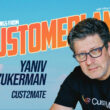There’s a professional quip, “I’m always right. Well, there was the time I thought I was wrong, but it turns out I was right!” It came to mind because a few months ago I asked the question, “Are celebrity endorsements to blame for the crypto crash?” At the time I wrote that they were in part. Later, as the category collapsed, I thought I was wrong, but it turns out, I was right! At the time I noted celebrities (and their managers and agents and publicists and accountants and wives and ex-wives) had come to look upon the shilling of product or service as an “additional income stream.” Short-term windfalls between long-term gigs.
Part avarice, part adulation, the escalation of celebrity endorsements has been fueled by the waning of brand meaning. Not brand awareness. Awareness is easy. Meaning is far more difficult. Differentiation more so. And sure, celebrities are a relatively easy – if not entirely abiding and resilient – way of imbuing brands with, well, something, consumers might engage with. Brands hope whatever the celebrity means to the public will rub off on the brand. But then, hope is never a good strategy.
Anyway, there they are. Celebrities telling you about something they’ve been paid to tell you about. Brands think that kind of co-branding (products/service + celebrity) is synergistic, but it’s also dangerous. Not for the celebrity. They get paid no matter what. And not for the brand. They get the celebrity. It can be dangerous for the consumer. The thing is, those celebrities, they’re just that. Famous people. Actors and actresses, acting. It’s what they do. What they’re paid to do. What they don’t do, and what they aren’t, are category experts who can speak knowledgably about the things they’ve been paid to speak about. They show up for hair and makeup and get filmed telling you stuff they’ve been paid to tell you. It’s a couple hours work for a couple of days, and voila! Off to the next gig.
But that’s where things can go wrong. Celebrity co-branding is based on getting consumers to think, “I want to be just like them,” and “they know things I don’t.” I mean, who doesn’t want to be beautiful and rich and have nice clothes and a mansion and an entourage. Why wouldn’t you trust someone with a gabillion Twitter followers and a gabillion dollars. Who doesn’t want to be the person who lives the lifestyle of the rich and famous? Come on. Sure you do. I do too. Everyone does. But when it comes to that kind of branding, details related to the product or the service habitually get lost in the fog of fame. I’m right about that!
Take the Kardashians. Everybody knows the Kardashians. For lots of things, but they’re mostly known for, well, being known. They got in trouble a while back promoting a prepaid debit card. A brief precis of that branding fiasco: The Kardashian Kard (yes, that was the name!) targeted financially unsophisticated young adults, enticed by the Kardashian family’s lifestyle of extravagance and luxury. The cards had outrageously high fees. And eventually the Kardashians were forced to end their endorsement. A legal representative of the Kardashian “brand” wrote, “Unfortunately, the negative spotlight threatens everything for which they have worked.” The ”they,” in that instance, being the Kardashians, not the debit card brand, and not the poor suckers who bought into the Kardashian image. So, no harm, no foul, right?
Wrong. Prepaid debit cards don’t have the same protections as traditional debit cards and consumers, who bought into the Kardashian image, ultimately found they had been bamboozled. Duped. Hoodwinked. Conned. The Kardashians may be known for a lot of things, but not their credit card acumen. Spending? For sure. Issuing? Not so much! So why would a consumer trust them? Why would they make financial decisions based on their insights? And yeah, I know. Caveat emptor and all that. But generally speaking, celebrity branding always trumps brains.
The Kardashian Kard should have been a cautionary tale for celebrities, consumers and brands. But alas, not so much. Especially when it came to cryptocurrencies, where lots of celebrities took a dip in the additional-income stream, urging consumers to invest in bitcoin. Many celebrities got paid for their “advice.” Not in bit coin, I’m betting. I could be wrong about that, but I don’t think so. And surprise! Kim Kardashian was one of those celebrities. You might have thought she had learned her lesson in the debit card debacle, but apparently not. BTW, The bitcoin sector lost $2 trillion in value YOY. So, who’s to blame?
Well, Kim Kardashian for one. Or at least according to the Securities and Exchange Commission. They announced a $1.26 million settlement with the celebrity for not disclosing she had been paid $250,000 to promote a crypto brand on Instagram as being a good investment, the hallmark of her “brand” being the promotion of other brands she ostensibly uses. The SEC has warned investors not to buy stuff just because it had celebrity backing, but that’s how a lot of branding works today, aka, “There’s some celebrity out there who’ll hawk this stuff.” Another legal representative of the Kardashian brand noted the client was, “Pleased to have resolved this matter with the SEC.” Wow, I’ll bet!
The thing is, a celebrity’s investment is always in themselves. The product or service is always secondary. You the consumer? Not a blip on their accountant’s radar. The level of trust a celebrity can engender is paramount. For them. Ms. Kardashian found out what that price is. $1.26 million. Well, that was for her. And marketing history has shown that a brand heavily invested in a celebrity always suffers much more devastatingly negative effects during bad times than the celebrity themselves.
As to that, I’m absolutely right!
 Robert Passikoff is founder and CEO of Brand Keys. He has received several awards for market research innovation including the prestigious Gold Ogilvy Award and is the author of 3 marketing and branding books including the best-seller, Predicting Market Success. Robert is also a frequent contributor to TheCustomer.
Robert Passikoff is founder and CEO of Brand Keys. He has received several awards for market research innovation including the prestigious Gold Ogilvy Award and is the author of 3 marketing and branding books including the best-seller, Predicting Market Success. Robert is also a frequent contributor to TheCustomer.













